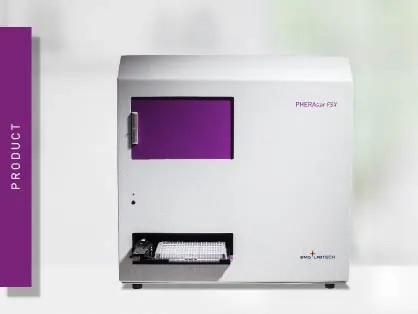
PHERAstar FSX
Powerful and most sensitive HTS plate reader


Microplate readers are versatile tools for the study of protein degraders. Learn more in this interview about how targeted protein degradation is being used for the development of next-generation therapeutics.

Helen Harrison, Director of Screening at Amphista Therapeutics, discusses targeted protein degradation (TPD) and the discovery of drugs in this area.
Amphista focuses on the development of novel TPD approaches. How do these targets differ from more traditional
‘druggable’ targets and what are the benefits of this approach?
TPD approaches can completely remove pathogenic proteins, rather than just inhibiting their function, providing potential for more potent or broader pharmacology, improved selectivity and better sustained in vivo effects. Binders to the target do not need to be functionally active, opening the possibility of degrading undruggable targets and moving beyond the limitations of current inhibitors.
While the first-generation of TPD therapeutics paved the way for this new approach, they also highlighted challenges and limitations. How is Amphista overcoming these?
First generation TPD approaches, largely based on mechanisms that recruit the ubiquitin E3 ligases cereblon or VHL, have been very successful so far, but there are some cell types in which they work less well. Tumours can also develop resistance mechanisms that may limit the clinical duration of action and only a small subset of TPD agents can be dosed orally or enter the central nervous system (CNS), making it challenging to expand into indications beyond oncology. Amphista degraders’ novel mechanism has been shown to work across a much wider range of cells than cereblon-based agents and demonstrates low potential for emergence of tumour resistance. Also, due to the unique chemistry used by Amphista degraders, they present good oral bioavailability and can be readily designed to enter the CNS.
What role do microplate readers play in your work?
A quick, reliable and sensitive plate reader is an invaluable part of Amphista’s screening cascades. We routinely use luminescence, TR-FRET and absorbance capabilities of the PHERAstar FSX in screening assays across multiple targets to measure the levels and downstream functional effects of protein degradation. The ability to run cell-based assays in a kinetic mode using the atmospheric chamber of the CLARIOstar also gives us insights into the mechanistic effects of our degraders.
You have chosen the PHERAstar FSX plate reader as a core screening instrument in your laboratory. What criteria did
you use in your evaluation?
For a growing and ambitious company like Amphista, the modular aspect is important; we can easily add functionality to the PHERAstar FSX in the future to expand our capabilities, increase throughput or integrate with lab automation. In head-to-head studies, I have found the PHERAstar FSX plate reader outperforms others in terms of speed, sensitivity and reproducibility. The control and analysis software packages are simple to use and integrate well into our electronic lab notebook (ELN). Finally, the technical support from BMG LABTECH is outstanding.
As an experienced and successful leader in drug discovery, what are the biggest changes in the development of this field and what excites you most about the future?
I feel the field has evolved from a volume-based, often serendipitous, approach of ultra-high-throughput screening (uHTS) of small molecule libraries in simple biochemical assays to a more hypothesis-based approach. Scientists are investing more time in robust target validation and rational, often structurally enabled, compound design. There has been an increasing focus on assays such as three-dimensional (3D) cell culture, complex co-cultures and patient-derived cells, which can more accurately predict how a molecule will behave in vivo. We have also seen a recent increase in the use of bioinformatics and artificial intelligence (AI) techniques to identify new targets and re-purpose current molecules. This is my first role in the field of TPD and the possibilities of targeting what might have previously been considered “undruggable” is what really excites and motivates me.
Helen Harrison
Helen is the Director of Screening at Amphista Therapeutics. From the company’s new lab facility at Granta Park, Cambridge, UK, she leads development, validation and execution of a range of plate-based assays, profiling the company’s unique degrader molecules. Her team enables high-throughput screening to support the company’s rapidly expanding pipeline.
The interview was firstly published on drugtargetreview.com
Helen Harrison is currently Director of Discovery Biology at Storm Therapeutics.
Powerful and most sensitive HTS plate reader
Most flexible Plate Reader for Assay Development